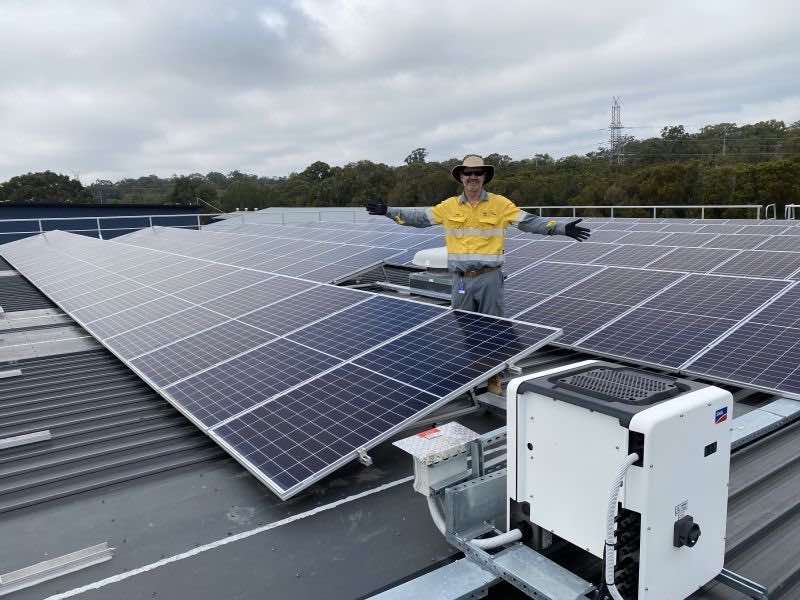

Image: Energy Queensland
The Queensland state government is setting the stage for a $4,000 rebate for battery storage, following years of campaigning by advocates.
Changes were made on Friday to legislation that will allow the creation the Battery Booster Rebate Scheme, which will pay up to $4000 to property owners who want to install batteries alongside new or existing rooftop solar systems with a capacity of 5 kW or higher.
The government’s new household battery rebate scheme is targeted at households earning less than $180,000 a year. Households with an income less than $66,667 a year can access a slightly higher rebate of $4000, whereas all others can get a $3000 payment.
It’s unclear when this scheme will begin, but minister for energy, renewables and hydrogen Mick de Brenni told the ABC that it should start sometime next year.
“Part of our revolutionary Queensland Energy and Jobs Plan is the development of a new household program, including support for batteries, to further support Queenslanders manage their electricity bills and usage,” he told the ABC. “Our Battery Booster Rebate Scheme is designed to do that.”
The rebate is supposed to offset the costs of installing a battery.
According to Solar Choice in February these costs can be anywhere from almost $5000 for a 3 kWh battery and inverter system up to $26,000 for an 18 kWh system.
The move is in stark contrast to the government’s previous position.
In June 2022, de Brenni told the ABC that investing in the grid was a better way to bring down power prices than handing out rebates to individuals. “We think the thing that makes the most sense for the most households is to invest in large-scale storage,” he told the national broadcaster.
De Brenni’s office has been contacted for comment.
Another reason to go off grid?
While batteries might not make sense for many consumers in the southern states, Queensland may be a different story – not only because of the sheer amount of sunshine the state receives.
From February this year all solar systems larger than 10 kW had to be fitted with a generation signalling device (GSD) which allows network operators to switch them off entirely at will in cases of “emergency events”, according to state power company Ergon Energy Network.
The basic on/off switch has been strongly criticised by industry and peak bodies for being outdated, reckless and likely to impose large extra costs” on consumers and installers.
But this move, combined with the new battery rebate, may also prompt Queenslanders with large rooftop solar systems to quit the grid entirely.
Remove gas reliance, bring down prices
Batteries might be able to bring down wholesale power prices by reducing demand during peak periods when expensive gas generators are typically online, says Stephanie Gray, a campaigner at the Queensland Conservation Council.
“Increasing the uptake of batteries, including household, community and network batteries, increases the resilience of our energy system and will help keep the lights on. Batteries can react with lightning speed to plug gaps in our electricity supply,” she says.
“As Queensland gears up to close our ageing coal-fired power stations it’s essential that we invest in all different forms of energy storage, like batteries, pumped hydro and even electric vehicles that can feed electricity back into the grid, so that we have cheap renewable energy available around the clock.”
Batteries aren’t for everyone
But not everyone thinks home batteries are a solution to household power bills, particularly in the southern states where rooftops may not be as extensive as in Queensland nor the sunshine as prevalent.
“In Melbourne you can put about $2 worth of [electricity] value into a battery, because you’re charging it with cheaper or nearly free electricity, and emptying it at night,” says home energy advisor and My Efficient Electric Home founder Tim Forcey.
“Probably very few people are going to have enough roof cover and enough sun to be able to charge up the battery all the time and the demand overnight to empty the thing, so you lose your $2.”
Forcey says people need to remember to look at the payback period if they’re considering a home battery as well as be engaged enough to monitor it. He notes that many people don’t look after or monitor their rooftop solar systems, and batteries add a bit more complexity on top of that again.
“We keep waiting for the price of batteries to come down, but all of the lithium is going into cars, as it should be… whereas we really need a different battery chemistry for the home that doesn’t compete with cars and it doesn’t have to be lithium, and it doesn’t have to be light bc it’s not going anywhere,” he says.
“It seems a long way from being economic, and there are 10 other things you can do around your house.”
This post was published on December 11, 2023 11:54 am
Rising energy bills are driving a surge in complaints. The NSW Energy Ombudsman wants better…
Australians are often being misled when they try to make sustainable electrical appliance choices, and…
China EV giant bows to trend of offering "complete solutions" for home energy, with launch…
NSW Energy and Water Ombudsman Janine Young unpacks the surge in energy complaints and explores…
New data shows home battery installations had a bumper second half in 2024 – but…
Anibal Zarate's family lived so well through Tropical Cyclone Alfred that even his sceptical neighbours…